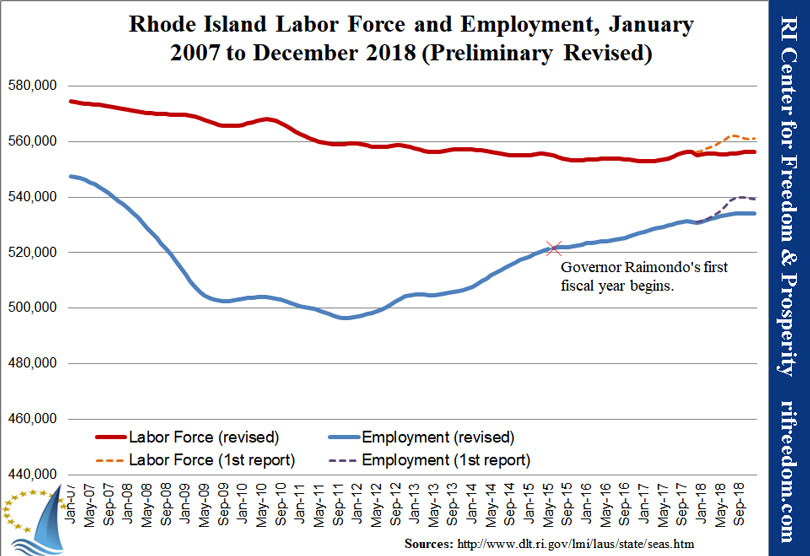I’ll provide more depth with my usual employment post and Jobs & Opportunity Index (JOI) write-up after all the data becomes available tomorrow, but at first glance, it looks like the national recovery might be stalling out in Rhode Island:
The number of employed RI residents was 539,800, an increase of 200 from the August figure of 539,600. …
The RI labor force totaled 561,900 in September 2018, down 300 from August 2018 but up 6,000 from September 2017 (555,900).
… In September, the number of Rhode Island-based jobs was unchanged from the August revised employment level of 502,100. Overall, Rhode Island’s job count is up 7,000 from September 2017.
Keep in mind that these numbers are all seasonally adjusted, so one can’t cite the end of our summer season as the reason that RI-based jobs have stagnated, employment growth has slowed, and the trend of fewer people looking for work has resumed. If this is a slowdown, then maybe Rhode Island is a leading indicator for the rest of the country, or maybe our approach to policy has become so different from that of the federal government and other states that the Ocean State is now unable to capitalize on economic growth, period.
Tangential to this topic, I’ve seen murmurs here and there blaming the Republican tax cuts for current deficit problems at the national level. Yeah, well, I kind of wonder about that:
The Treasury Department reported this week that individual income tax collections for FY 2018 totaled $1.7 trillion. That’s up $14 billion from fiscal 2017, and an all-time high. And that’s despite the fact that individual income tax rates got a significant cut this year as part of President Donald Trump’s tax reform plan. …
Other major sources of revenue climbed as well, as the overall economy revived. FICA tax collections rose by more than 3%. Excise taxes jumped 13%.
The only category that was down? Corporate income taxes, which dropped by 31%.
Overall, federal revenues came in slightly higher in FY 2018 — up 0.5%.
Spending, on the other hand, was $127 billion higher in fiscal 2018. As a result, deficits for 2018 climbed $113 billion.
See also:
The U.S. economy sits atop of the World Economic Forum’s annual global competitiveness survey for the first time since the 2007-2009 financial crisis, benefiting from a new ranking methodology this year, the Swiss body said on Tuesday.
We are the economy — you and me. Our activity is the economy. The progressive approach to economic development that Rhode Island pursues is to control what we do in a way that powerful people believe is best, which includes taxing us so the government can redistribute the wealth. Stop doing that, and our economy will soar; government revenue should be secondary.

